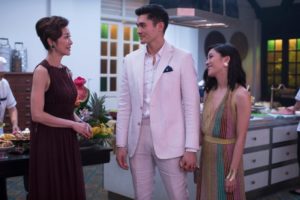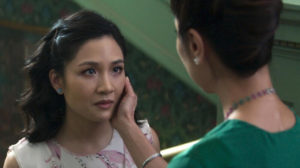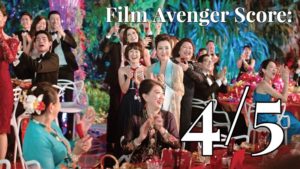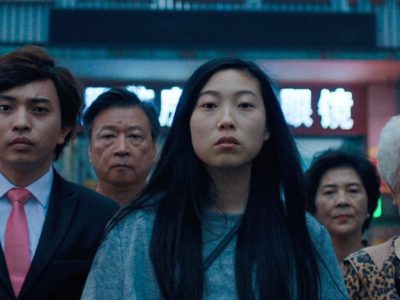Review| Crazy Rich Asians – A Man, a Woman, and Mom
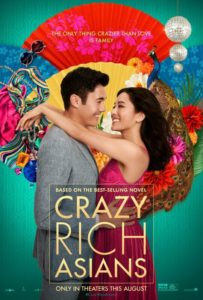 To be honest, what initially interested me in this film was the title. Crazy Rich Asians sounded fun, funny, slyly self-aware, and politically incorrect – which are all concepts I gravitate toward in a film.
To be honest, what initially interested me in this film was the title. Crazy Rich Asians sounded fun, funny, slyly self-aware, and politically incorrect – which are all concepts I gravitate toward in a film.
I hadn’t really heard anything else about this movie, aside from the absurd “controversies” over pedantic notions like the racial diversity of the all-Asian cast (apparently the actors aren’t diverse enough for some), the displays of over-the-top opulence in the film (it’s called Crazy Rich Asians, isn’t it?), and other superficial, material, identity-obsessed stupidity. It seems that people, especially those obsessed with identity politics, will always find a reason for grievance, even with entertainment that is intended to be a fun, romantic story set within a certain culture.
Crazy Rich Asians is a very good film—probably the best romantic comedy I’ve seen in quite a while. I had a great time watching it. Is it a “groundbreaking” film as is claimed by critics and others in the purported intelligentsia? No. There have been many great Asian-centric films over the years that have been hits in America and around the world (Crouching Tiger, Hidden Dragon, to name just one). It’s a funny romp through a foreign culture from an Asian-American perspective. It’s very sweet in parts and confusing in others, but overall it was a great time at the movies. People just need to get off their prideful, virtue-signaling high-horse, put their mental color-blind glasses on (if they have any), and just enjoy the story.
Speaking of color-blindness, Crazy Rich Asians has at its core universal themes that every culture and ethnicity can understand. In terms of the greater Truth of God, the film wonderfully displays one of the fundamental facts of life that humanity has been grappling with since the first mother-in-law engaged her son’s beloved in a battle of wills.
SPOILERS AHEAD!
The Good – A Beautiful Travelogue
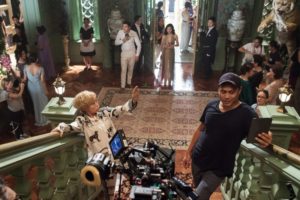 Director Jon M. Chu has stepped up his visual storytelling game with Crazy Rich Asians. The film moves with a music video-style energy that matches the dynamic shot composition. The camera was almost constantly moving, which is both good and not-so-good in parts. Chu’s color palette was also quite mesmerizing, especially in the lighting and costumes.
Director Jon M. Chu has stepped up his visual storytelling game with Crazy Rich Asians. The film moves with a music video-style energy that matches the dynamic shot composition. The camera was almost constantly moving, which is both good and not-so-good in parts. Chu’s color palette was also quite mesmerizing, especially in the lighting and costumes.
The film was really beautiful to look at, with the stunning vistas being showcased better than any travelogue I’ve seen. The vitality of the culture of Singapore is also on full display – a very western place with an eastern soul steeped in tradition. Even the soundtrack (featuring some wonderful music by Brian Tyler) perfectly matched the visuals with its jazzy interludes peppered with Asian pop star covers of western songs.
The cast of this film was really good. One can tell they had a great time making the movie. The two leads – Constance Wu and Henry Golding – had excellent chemistry, with the former engendering a lot of sympathy with her awkward cultural missteps. Awkwafina and her eccentric family (which included the hilarious Ken Jeong) provided some stellar lighthearted moments.
The real standout performance was from Michelle Yeoh as Eleanor, Nick’s steely-eyed mother. Her poise and coldness provided an air of mystery where we are in Rachel’s shoes and can’t really figure the woman out until it’s too late.
The Bad – Priorities in Indulgence
Though I never felt the film’s two-hour length (which is a definite achievement), there were several spots in the film’s narrative where Jon Chu and his scriptwriters opted for more music-inspired montages when they should have been building the character relationships just a little bit more. Some of the characters could be considered one-note because we’re not really given any breathing time to get to know them. There were great scenes, like the quiet conversations between Rachel and Astrid about the latter’s husband’s infidelity.
In terms of narrative, Astrid’s infidelity subplot was almost completely unnecessary. It added nothing to the storyline except a brief and somewhat forced payoff at the end. The time devoted to them would have been better served by building up underdeveloped characters and giving more of them chances to shine.
One narrative button that I was hoping would have been paid off was an appearance by Nick’s father, who is talked about but never seen. The film set the Young patriarch as a definite presence, but it would have been nice to have him added to Eleanor’s character arc and perhaps have him knock some emotional sense in her. In the novel, he and Eleanor are actually separated; which, if it is the same in the film, was never really implied or conveyed well.
Leaving and Cleaving
The central plot of Crazy Rich Asians revolves around Nick Young, his girlfriend Rachel Chu, and Nick’s mother, Eleanor. Obsessed with wealth and social status, Eleanor does not approve of Nick’s relationship, citing Rachel’s “common” upbringing and American sensibilities. Eleanor goes out of her way numerous times to make Rachel feel uncomfortable and unwanted, even telling Rachel she will never be good enough for her son and sending a private investigator out to discover Rachel’s true lineage.
“For this reason, a man shall leave his father and his mother, and be joined to his wife; and they shall become one flesh.” -Genesis 2:24
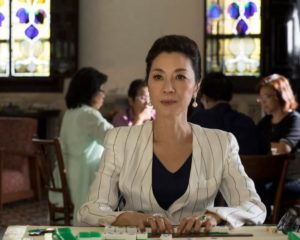 There comes a time in every man or woman’s life when they meet someone and start their own family, leaving their respective families behind to begin something truly sacred with another person: a marriage and a new family. Some parents have trouble letting go – especially mothers with their sons.
There comes a time in every man or woman’s life when they meet someone and start their own family, leaving their respective families behind to begin something truly sacred with another person: a marriage and a new family. Some parents have trouble letting go – especially mothers with their sons.
In the film, Nick struggled with standing up to his mother and her expectations for his life. Most Asian cultures put great emphasis on family and familial responsibilities, and the matriarch of a family does have a lot of sway over the lives of her children and grandchildren. But it seemed that Eleanor was more concerned about her family’s social status—even to the point of overriding her Christian faith when dealing with Rachel (Eleanor was seen leading a Bible study early in the film).
Throughout the Bible, great emphasis is put on children leaving their parents and cleaving to their spouse, forming a new, more powerful bond. It’s a fundamental truth of life, going all the way back to Genesis. Jesus even referenced Genesis when asked by the Pharisees about divorce in Matthew 19 and Mark 10. The bond between husband and wife is God-willed and intended to be stronger than that of parent and child – so strong that “no man can separate” it.
That’s why I was so glad that Eleanor finally approved of Rachel at the end of the film. She realized that her meddling would only strain the relationship with her son. Her own mother-in-law still lived with her and had made her feel less-than for decades. She looked into an emotional mirror and saw what could happen down the road (with a husband nowhere to be found).
I sympathized with Nick’s situation. I had similar difficulties with my mother when I married my wife (albeit minus the great wealth). My mother can be demanding and is also steeped in cultural expectations (in her case, Latino culture). I would often not hesitate to help her if she asked; in fact, I was happy to because I understood these acts as those of a good son.
When I got married, it was hard for me to take a step back from my mother at first, which was hard on my wife. Pastor Ted Cunningham said in an article for Focus on the Family that “Your preferred person in life is now your spouse. Mom is no longer your No. 1 woman…” And it took me a while to realize that. My wife was now my top priority and I slowly started to detach from my mother.
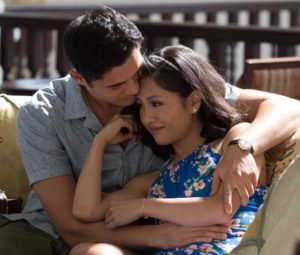 It’s a lot better now, but it is still a struggle sometimes. Through hard conversations, prayer, and grace, we have better-established boundaries with my mother. There are sporadic awkward situations, but my wife and I work through them and I learn from them. Like Rachel in the film, my wife is a fighter and is more than capable of holding her own with my mother. However, in the end, any changes in me and my mother’s relationship have to come from me.
It’s a lot better now, but it is still a struggle sometimes. Through hard conversations, prayer, and grace, we have better-established boundaries with my mother. There are sporadic awkward situations, but my wife and I work through them and I learn from them. Like Rachel in the film, my wife is a fighter and is more than capable of holding her own with my mother. However, in the end, any changes in me and my mother’s relationship have to come from me.
God’s plan for the husband/wife dynamic can only work if the parents aren’t part of the equation. There is only room for three in that intimate of a relationship: the husband, the wife, and God. Meddling parents only complicate things and create strife between the spouses, especially in the formative years of the relationship. In fact, it is actually the responsibility of the parent to make sure their child is ready for adulthood, which includes marriage.
The Final Word
Crazy Rich Asians is a good time at the movies and one of the best romantic comedies I’ve seen in years. Full of wonderful visuals and an infectious energy, the film really showcases the Asian culture in a fun and slyly self-aware way.
The importance of the relationship between a man and a woman being free from outside influences is put on full display in this film. Parents should take a page from God’s word and steer clear of their children’s marriages. They are not your children forever. They will, if God wills it, become husbands and wives for someone else. It’s important for parents to follow this line of thinking and let their children leave their home and cleave to their new spouse. For in the midst of that new relationship, God dwells.
If you’d like to read more about leaving your parents and cleaving to your spouse, check out the rest of Pastor Cunningham’s article here.


